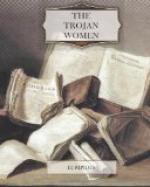[29] Her that spareth not, Heaven’s yokeless rider.]—Athena like a northern Valkyrie, as often in the Iliad. If one tries to imagine what Athena, the War-Goddess worshipped by the Athenian mob, was like—what a mixture of bad national passions, of superstition and statecraft, of slip-shod unimaginative idealisation—one may partly understand why Euripides made her so evil. Allegorists and high-minded philosophers might make Athena entirely noble by concentrating their minds on the beautiful elements in the tradition, and forgetting or explaining away all that was savage; he was determined to pin her down to the worst facts recorded of her, and let people worship such a being if they liked!
[30] To Artemis.]—Maidens at the shrine of Artemis are a fixed datum in the tradition. (Cf. Hec. 935 ff.)
[31] Andromache and Hecuba.]—This very beautiful scene is perhaps marred to most modern readers by an element which is merely a part of the convention of ancient mourning. Each of the mourners cries: “There is no affliction like mine!” and then proceeds to argue, as it were, against the other’s counter claim. One can only say that it was, after all, what they expected of each other; and I believe the same convention exists in most places where keening or wailing is an actual practice.
[32] Even as the sound of a song.]—I have filled in some words which seem to be missing in the Greek here.
[33]Andromache.]—This character is wonderfully studied. She seems to me to be a woman who has not yet shown much character or perhaps had very intense experience, but is only waiting for sufficiently great trials to become a heroine and a saint. There is still a marked element of conventionality in her description of her life with Hector; but one feels, as she speaks, that she is already past it. Her character is built up of “Sophrosyne,” of self-restraint and the love of goodness—qualities which often seem second-rate or even tiresome until they have a sufficiently great field in which to act. Very characteristic is her resolution to make the best, and not the worst, of her life in Pyrrhus’ house, with all its horror of suffering and apparent degradation. So is the self-conquest by which she deliberately refrains from cursing her child’s murderers, for the sake of the last poor remnant of good she can still do to him, in getting him buried. The nobility of such a character depends largely, of course, on the intensity of the feelings conquered.
It is worth noting, in this connection, that Euripides is contradicting a wide-spread tradition (Robert, Bild und Lied, pp. 63 ff.). Andromache, in the pictures of the Sack of Troy, is represented with a great pestle or some such instrument fighting with the Soldiers to rescue Astyanax ([Greek:’Andro-machae]= “Man-fighting").
Observe, too, what a climax of drama is reached by means of the very fact that Andromache, to the utmost of her power, tries to do nothing “dramatic,” but only what will be best. Her character in Euripides’ play, Andromache, is, on the whole, similar to this, but less developed.




